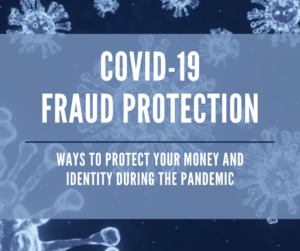
The COVID-19 crisis has not only stolen the health and well-being of people all over the world, but now, it seems, it has opened the door to criminals who want to steal your money and your identity. Historically, when there are times of crisis, the crime rate increases. We see this with natural disasters when stores are looted or when the economy is tanking and theft increases. Now, we are seeing this scenario play out in real time as thieves use the pandemic and fear to their benefit.
SCAMS TO WATCH OUT FOR
According to Forbes, Americans have lost more than $106 million to fraud related to COVID-19. These losses originate from all types of scams ranging from seeking donations for non-existent charities to price gauging for personal protective equipment. Dishonest individuals call victims and impersonate health organizations with a cure for COVID or products that can prevent infection if you just give them a credit card number. False bank accounts have been opened for the sole purpose of depositing unemployment benefit checks for non-existent persons. With crime so rampant, how can you tell what’s true and what’s false pertaining to this crisis? Here’s some big scams that you can look out for:
- Phishing/SMishing—Emails or text messages that appear to be from your bank or from an online retailer ask you to click a link or call a number so that you can verify personal information.
- Work-from-home scams—Posing as a company or even one of your co-workers, criminals email about fake opportunities to work from home and ask you to apply for a job by giving out personal information.
- Medical fraud—Fake websites are launched with virus testing kits or medical supplies for sale and collect credit card information.
- COVID contact tracing—In an attempt to steal personal information such as social security numbers, fraudsters claim to be contact tracers and have identified you as a possible close contact of a COVID patient. Now they ask you for your info to verify and log your exposure to the virus.
- Vaccine scheme—Calling individuals to sign them up to receive the COVID vaccine, the imposter asks for your personal information.
WAYS TO PROTECT YOURSELF FROM FRAUD
- The number one way to protect yourself from possible fraud related to the COVID-19 crisis is to never give out your personal information in response to an unsolicited email or phone call. If you haven’t called the company/bank/organization directly, and someone contacts you asking for your birthdate, maiden name, social security number, etc, don’t give it out. You have the right to decline their request so that you can feel secure in releasing your information. Simply tell the solicitor that you want to call them back and then look on your bill/website/known contact information and call that number to affirm that the person who contacted you is indeed who they say they are.
- If you suspect that your identity has been stolen, contact one of the three big credit bureaus: Equifax, Experian, or TransUnion. When you contact one of these agencies, you can request a freeze be put on your credit so that scammers cannot open any new accounts in your name.
- “Report financial identity theft fraud attempts to the FBI. The toll-free number is easy to remember: 1-800-CALL-FBI. Or you can go online to FBI.gov” reports Terry Savage, Next Avenue podcast co-host. Forbes has a great transcript of a recent episode online with lots of fantastic tips for protecting yourself against fraud and you can access it HERE.
In the midst of this pandemic crisis, the most important thing to focus on is the health and welfare of yourself and those you care most about. You shouldn’t have to waste time and effort chasing down scammers who have preyed on you when you are the most vulnerable. By following these easy (and always applicable) tips for protecting your identity and your finances, you can keep your focus on what really matters.
